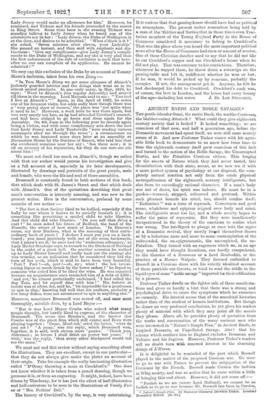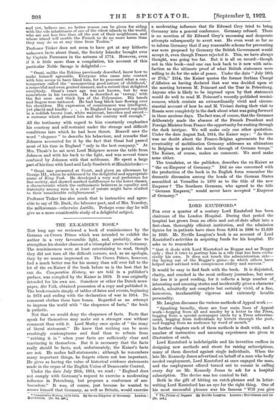ANCIENT BARDS AND NOBLE SAVAGES.*
THE gentle islander Omai, the rustio Duck, the warlike Corsicans, the blubber-eating Attuiock ? What could they give eighteenth
century society that it lacked ? It lacked something ; we are conscious of that now, and half a generation ago, before the Romantic movement had spent itself, we were still more acutely aware of it. And now Professor Tinker comes with his agree- able little book to demonstrate to us anew how from time to time the eighteenth century itself grew conscious of this lack and turned to the notion of the Noble Savage, the Uncorrupted Rustic, and the Primitive Corsican citizen. This longing for the sweets of Nature which they ,had never tasted, this dissatisfaction with their state, seems, as we now see it with a more perfect system of psychology at our disposal, the com- pletely natural reaction not only from the crude physical
metropolitanism of the eighteenth century intelligentsia, but also from its exceedingly rational character. If a man's body was out of doors, his spirit was indoors. He must be in a
garden—terraced, stepped, columned and grottoed. Within such pleasant bounds his mind, too, should confine itself. " Enthusiast " was a term of reproach. Correctness and good sense, whalebone and epigram reigned over body and mind.
The intelligentsia went too far, and a whole society began to suffer the pains of repression. But they were insufficiently
inexperienced in the theory of the emotions to realize what was wrong. Too intelligent to plunge at once into the orgies of a Romantic revival, they merely found themselves drawn
as by a lodestone more and more to some contemplation of the unbrocaded, the un-epigrammatic, the uncoupleted, the un- Paladian. They turned with an eagerness which we, in an ago they would have thought licentious, can hardly comprehend, to the theories of a Rousseau or a Lord Monboddo, or the practice of a Horace Walpole. They listened enthralled to Boswell in a Corsican dress with his strictly idealized account of these patriotic cut-throats, or tried to read the riddle in the liquid eyes of some " noble savage " imported foe their edification by a pioneer.
Professor Tinker dwells on the lighter side of these manifesta- tions and gives us hardly a hint that there was a strong and psychological drive to cause the symptoms which he examines so cursorily. His interest seems that of the anecdotal historian rather than of the student of human institutions. But though he draws no very profound conclusions, he yet gives his readers plenty of material with which they may point all the morals they please. Above all, he provides plenty of quotation from the works and conversation of the many eminent men who
were interested in " Nature's Simple Plan," in Ancient Bards, in inspired Peasants, or Unpolluted Savage. Alas ! that his scheme which confines him to England excludes Rousseau and Voltaire and his Inginue. However, Professor Tinker's readers will no doubt turn with renewed interest to the charming doings of L'Huron.
It is delightful to be reminded of the part which Boswell played in the matter of the proposed Corsican war. We were to go to war with France to prevent the subjugation of the Corsicans by the French. Boswell made Corsica the fashion in Whig society, and was so active that he came within a little of bringing this end about. However, it did not come off :- "Foolish as we are (wrote Lord Holland), we cannot be so foolish as to go to war because Mr. Boswell has been in Corsica, • Nature's Simple Plan. By Professor Chauncey Brewster Tinker. Loudon;
numphrey Milford Lee. 6d.]
and yet, believe me, no better reason can be given for siding with the vile inhabitants of one of the vilest islands in the world, who are not less free than all the rest of their neighbours, and whose island will enable the French to do no more harm than they may do us at any time from Toulon."
Professor Tinker does not seem to have got at any hitherto unknown facts about Omai, the Society Islander brought over by Captain Furneaux in the autumn of 1774. However, even if it is little more than a compilation, his account of this particular Noble Savage is delightful: " Omai, unlike the Eskimo previously described, knew how to make himself agreeable. Everyone who came into contact with him seems to have liked him, for he possessed what a con- temporary called the ' unsuspecting good nature of childhood,' a respectful and even genteel manner, and a naivete that delighted everybody. Omai's exact age was not known, but he was somewhere in his twenties. He is described as ' tawny,' with the flat nose and thick lips of the Polynesian. His hands and fingers were tattooed. He had long black hair flowing over his shoulders. His expression of countenance was intelligent, yet placid and kindly. . . . In England he appeared regularly in a reddish brown coat, white waistcoat, breeches and sword- s costume which pleased him and the century well enough."
All the testimony with regard to him constantly emphasizes his courtesy and self-restraint under the strange and difficult conditions into which he had been thrust. Boswell uses the word " elegance " to describe his behaviour, and remarks that Johnson accounted for it by the fact that Omai had passed most of his time in England " only in the best company." At Mrs. Thrale's he sat next Lord Mulgrave across the table from Johnson and with his back to the light, and was several times confused by Johnson with that nobleman. He spent a large part of his time with Lord and Lady Sandwich atHinchinbroke :- " Omai was presented at Court, and given an allowance by George III., whom he addressed by the delightful and appropriate name of King Tosh. He developed a very real preference for fine society, and showed marked indifference to the lower classes, a characteristic which the enthusiastic believers in equality and fraternity among men in a state of nature might have studied to their considerable enlightenment."
Professor Tinker has also much that is instructive and agree- able to say of Mr. Duck, the labourer poet, and of Mrs. Yearsley, the milkwoman—otherwise Lactilla. Perhaps some day he will give us a more considerable study of a delightful subject.



































 Previous page
Previous page